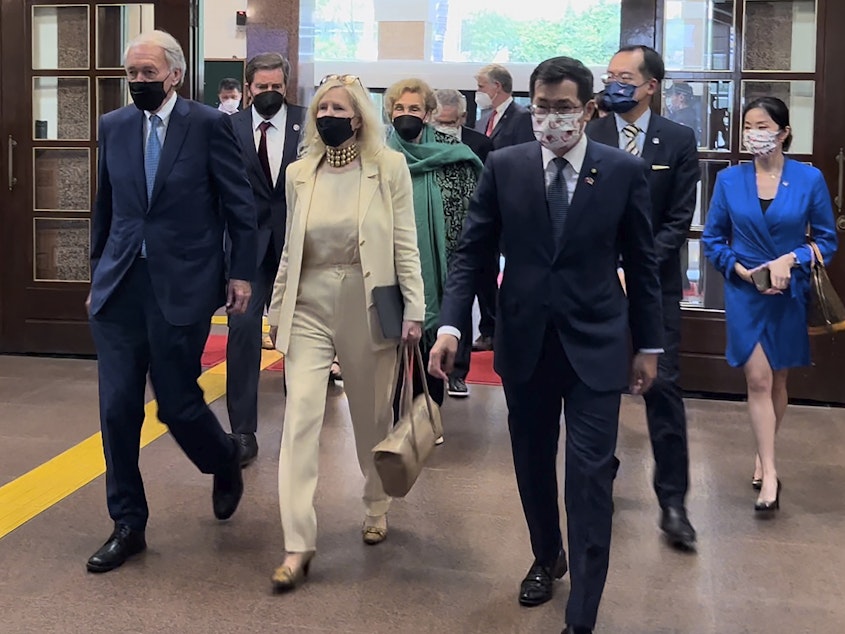China announces new drills around Taiwan as a U.S. delegation visits the island

TAIPEI, Taiwan — China announced more military drills around Taiwan as the island's president met with members of a new U.S. congressional delegation on Monday, in a further sign of support among American lawmakers for the self-governing island Beijing claims as its own.
Taiwanese media showed the delegation arriving for the talks, but details of the meeting were not immediately released. The delegation was due to depart later Monday on a U.S. government plane.
Updated August 15, 2022 at 4:53 AM ET
The visit came less than two weeks after U.S. House Speaker Nancy Pelosi's trip to Taiwan, which prompted days of threatening military exercises by China, including the firing of missiles over the island and into the Taiwan Strait. Pelosi is the highest-level member of the U.S. government to visit Taiwan in 25 years.
China also sent warplanes and navy ships across the waterway's median, which has long been a buffer between the sides that separated amid civil war in 1949. China regards formal contacts between U.S. politicians and the island's government as support for its independence from Beijing.
Additional drills in the seas and skies surrounding Taiwan were announced by China's People's Liberation Army on Monday, the Defense Ministry and its Eastern Theater Command announced in a statement.
The exercises are intended as a "resolute response and solemn deterrent against collusion and provocation between the U.S. and Taiwan," the ministry said.
China's previous two weeks of threatening exercises prompted Taiwan to put its military on alert, but were met largely with defiance and apathy among the public.
In Taipei, Taiwan's capital, the chair of the legislature's Foreign and National Defense Committee, Lo, Chih-Cheng, met with the U.S. lawmakers and stated that, "Their visit at this time is of great significance, because the Chinese military exercise is (intended) to deter U.S. congressmen from visiting Taiwan."
"Their visit this time proves that China cannot stop politicians from any country to visit Taiwan, and it also conveys an important message that the American people stand with the Taiwanese people," Lo said.
China says it wants to use peaceful means to bring Taiwan under its control, but its recent saber rattling has emphasized its threat to take the island by military force. The earlier drills appeared to be designed as a rehearsal of a blockade or attack on Taiwan, forcing the cancellation of commercial flights and disrupting shipping to Taiwan's main ports as well as cargo passing through the Taiwan Strait, one of the world's busiest shipping lanes.
The five-member congressional delegation is led by Democratic Sen. Ed Markey of Massachusetts and is to meet with other government and private sector representatives. Investment in Taiwan's crucial semiconductor industry and reducing tensions in the Taiwan Strait are expected to be key topics of discussion.
The other members of the delegation are Republican Rep. Aumua Amata Coleman Radewagen, a delegate from American Samoa, and Democrats John Garamendi and Alan Lowenthal from California and Don Beyer from Virginia.
A senior White House official on Asia policy said last week that China had used Pelosi's visit as a pretext to launch an intensified pressure campaign against Taiwan, jeopardizing peace and stability across the Taiwan Strait and in the broader region.
"China has overreacted, and its actions continue to be provocative, destabilizing, and unprecedented," Kurt Campbell, a deputy assistant to President Joe Biden, said on a call with reporters.
"It has sought to disregard the centerline between the P.R.C. and Taiwan, which has been respected by both sides for more than 60 years as a stabilizing feature," he said, using the acronym for China's official name, the People's Republic of China.
China accuses the U.S. of encouraging independence forces in Taiwan through its sale of military equipment to the island and engaging with its officials. The U.S. says it does not support independence for Taiwan but that its differences with China should be resolved by peaceful means.
China's ruling Communist Party has long said it favors Taiwan joining China peacefully but that it will not rule out force if necessary. The two split in 1949 during a civil war in which the Communists took control of China and the losing Nationalists retreated to Taiwan.
Campbell, speaking on Friday, said the U.S. would send warships and planes through the Taiwan Strait in the next few weeks and is developing a roadmap for trade talks with Taiwan that he said the U.S. intends to announce in the coming days. [Copyright 2022 NPR]
